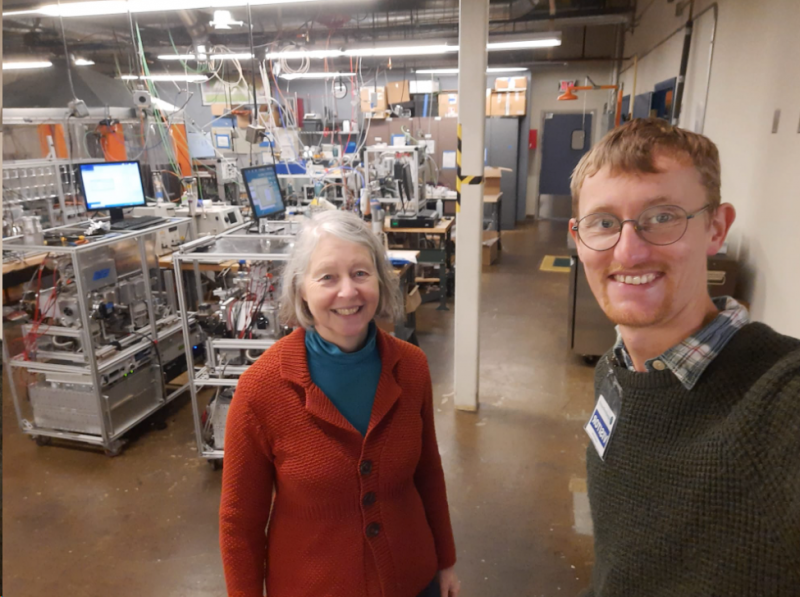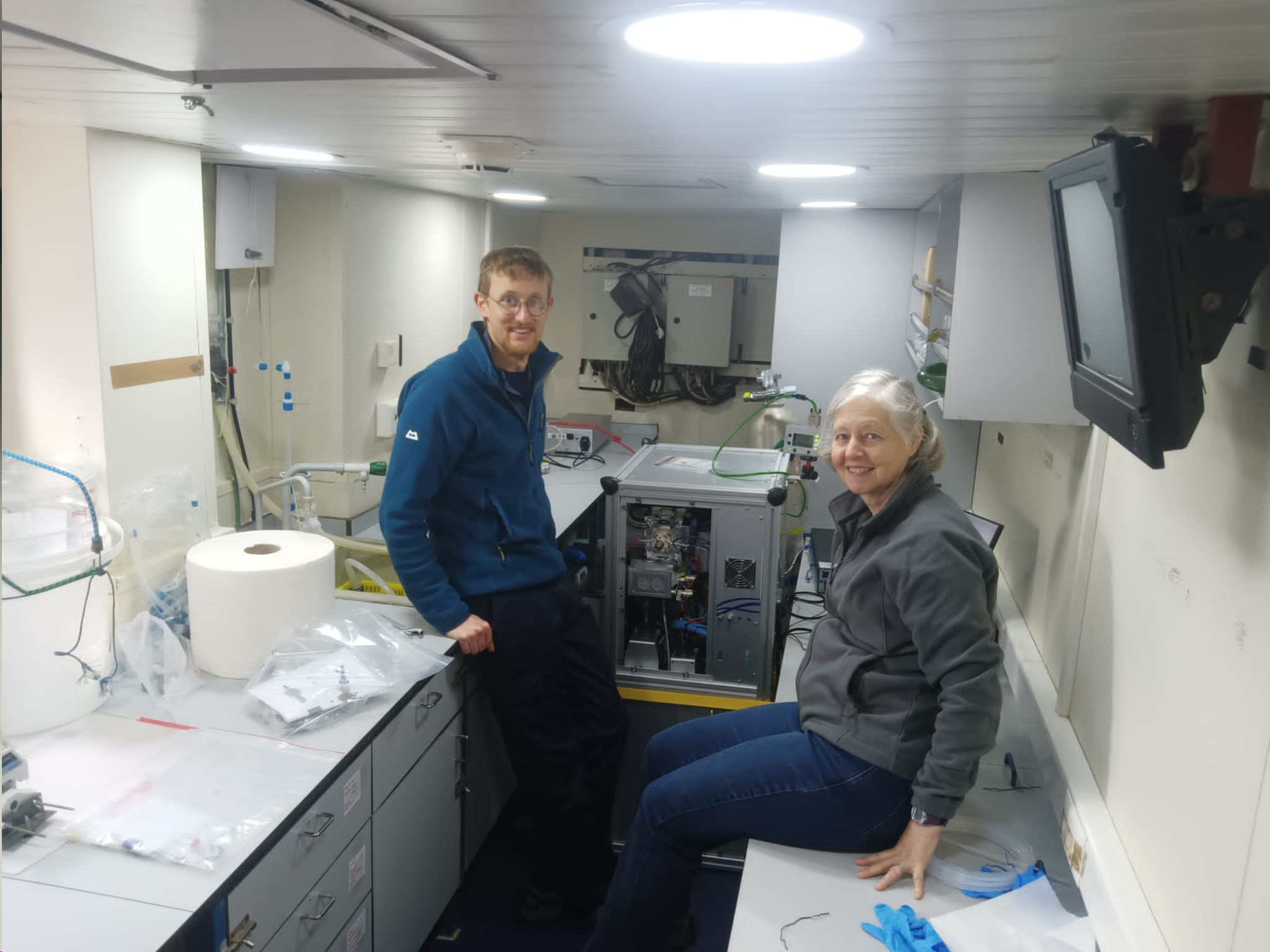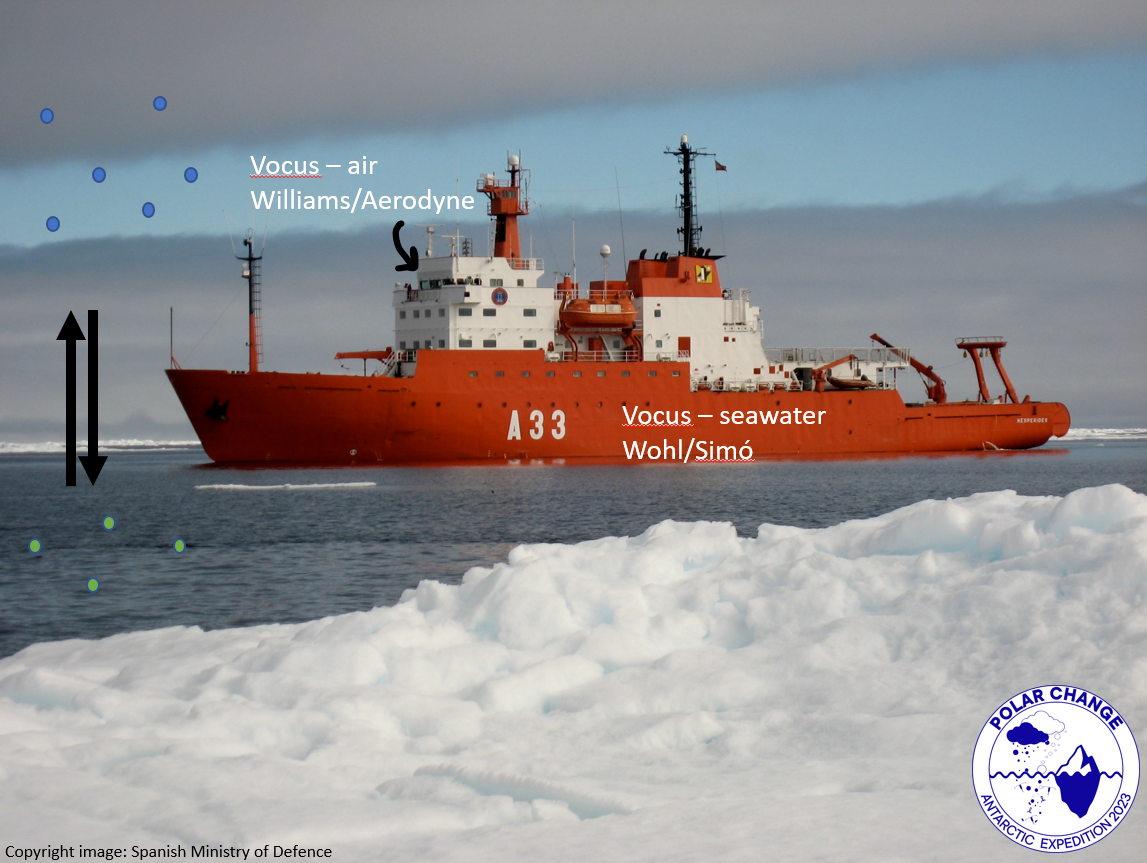Visit Aerodyne in Boston
Charel Wohl
University of East Anglia

Caption: Charel Wohl with Leah Williams showing him one of the laboratories at Aerodyne Research Inc. hosting an impressive number of instruments.
Charel Wohl is an early career researcher whose PhD and post-doc research focused on measuring volatile organic compounds and sulfur containing compounds dissolved in seawater and in ambient air to calculate sea-to air fluxes. After completing his PhD at Plymouth Marine laboratory in summer 2021, Charel moved abroad to pursue a post-doc in Barcelona at the ICM-CSIC improving his mass spectrometry skills by using a Vocus-PTR-ToF from Aerodyne Research, Inc. and taking part in Antarctic fieldwork (POLAR-CHANGE) using this instrument.

Caption: Charel and Leah Williams in Antarctica repairing one of the Vocus-PTR-ToF instruments on board.
Charel applied for the stepping stone bursary in April 2023 hoping to visit Aerodyne in Boston, MA to learn more about the details of operating and analysing Vocus data. The aim of the meeting was to share some of the data collected by another Vocus on board, measuring ambient air. Data from both instruments will be used to calculate sea-to-air fluxes of sulfur compounds from this cruise and speculate on the biogeochemical sources of these compounds. Like many researchers coming straight out of their PhD’s, Charel had little to no experience of independently applying for external funding to complete a short project. At that point in his career writing a justification to complete a piece of work was an extremely valuable experience as it has subsequently helped him when applying to more recent funding opportunities.
Charel’s application to the bursary was successful and he was able to use the bursary to fund the trip on the back of a visit to AGU 2023, with the intent of saving some carbon emissions. During the three-day-visit, Charel worked closely with Leah Williams from Aerodyne to process measurements from POLAR-CHANGE. Having not received in person training on the instrument due to the COVID pandemic, this visit allowed Charel to confirm his knowledge and talk about some artefacts he observed during the cruise. Charel also gave a presentation to the scientific staff at Aerodyne and interacted with a range of people with different interests, including high resolution mass spectrometers, gas chromatographs and measuring VOCs in seawater and soil using a membrane.

The decision to apply for the bursary has paid off. Half a year on from the receipt of the bursary, Charel has been able to use his expertise in running the Vocus at UEA in the laboratory, but fieldwork is planned at Weybourne in spring. Charel also shared some insights from his trip with Aerodyne instrument-users at the MLU mass spectrometry working group at FAAM. In the meantime, Charel is working on a publication focussing sea-to-air fluxes from the POLAR-CHANGE cruise involving many of the people Charel interacted with during his visit.
Charel would encourage other early career researchers to apply for the bursary. For those having doubts about applying he would like to highlight that the flexibility of the bursary means that it can be used in many different ways and the funding is upfront and not conditional on any research output. The bursary helped Charel learn new research skills and eventually helped him feel more confident in his Vocus analysis skills which will hugely benefit the CARES and MLU community.
Profile
Charel Wohl is now working as a Senior research Associate at the University of East Anglia with NCAS, where his research focusses on transport and processing of marine sulfur emissions over the North Atlantic as part of the CARES project. His work is also funded by the FAAM MLU and involves making measurements using a high spec Vocus-PTR-ToF refitted to fly on the FAAM aircraft. Charel enjoys taking good measurements at remote sites, be it aloft or at the poles, to help us better understand the global climate system and the marine atmosphere.
Latest News
Royal Society Publishing Photography Competition 2025
Please see a message from the Royal Society below:
We are delighted to announce that the 2025 Competition is now open for entries until 15 August for a chance to win £1000! The competition celebrates the power of photography in conveying the wonder of science happening all around us and photographs can be submitted in the categories of: Astronomy, Behaviour, Earth Science and Climatology, Ecology and Environmental Science, and Microimaging.
The competition is free to enter and open to anyone studying or working in science at graduate level or above. Category winners will receive a one-year membership to the Royal Photographic Society and the overall winner will receive a grand prize of £1,000. Find out more: https://bit.ly/RSPphotocomp
October 2025 MEDIN Workshop: Marine Data Management, Governance and the MEDIN toolset
The Marine Environmental Data and Information Network (MEDIN) are pleased to announce that registration is now open for the next occurrence of our popular free online training workshop: ‘Marine Data Management, Governance and the MEDIN toolset’ on the 13th – 17th October 2025 on OceanTeacher Global Academy.
Marine Data Management, Governance and the MEDIN toolset
The Marine Environmental Data and Information Network (MEDIN) and OceanWise are delighted to invite you to attend our popular free online training workshop: ‘Marine Data Management, Governance and the MEDIN toolset’ on the 19th – 23rd of May 2025.
